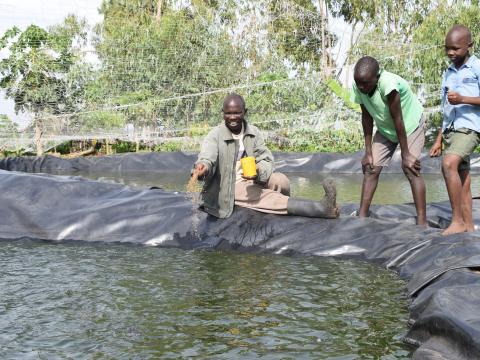Fish Farming Rescues Boy from Disease Complications

By Sarah Ooko, Senior Communications & Media Officer for World Vision in Kenya
Tobias was born with Sickle Cell disease, a condition that, for a long time, made him sick and weak. The effects of this disease often forced the 10-year-old to miss school.
His father, James, who was, at the time, a capture fisherman was not making enough money. With his meager income, he was unable to afford the medical care recommended for the effective management of Tobias's disease.
From his trade, James would make an average of about 60, 000 Kenya shillings ($600 USD) yearly which could hardly feed his large family - his wife and eight children, including Tobias.
Decreasing incomes, increasing needs
“The fish numbers in the lake have been reducing over the years. So, it was hard to get enough to sell and get a good profit. Taking care of my family was a big problem,” says James.
Consequently, he would watch helplessly as Tobias writhed in pain, while suffering from sickle cell disease attacks, since he could not always afford to take the child to hospital or get him the right treatment.
“At least Tobias is alive. Because I didn’t have money, I lost five other children, who died from sickness and insufficient food. Others had to remain home many times as I didn’t have school fees,” he states.
Hope on the horizon
Despite the seemingly insurmountable challenges, tides started changing for the family after James began a fishpond business, thanks to the training and support he received from World Vision, in collaboration with Kenya's Ministry of Agriculture, Livestock, Fisheries and Irrigation.
“I sold all my fishing boats and set up the ponds with about 150 Kenya shillings ($1.50 USD) to start with,” he says.
The business allows him to make about 200,000 Kenya Shillings ($2,000 USD) annually. This is more than three times what he used to get from lake fishing.
Due to the training he received on the importance of diversifying his income sources, James used the proceeds from fish farming to venture into horticulture, poultry and livestock farming. These additional activities have provided new revenue streams for his family.
“May God bless World Vision. Because of the support they gave my dad, I have been receiving good care and going to the hospital whenever I am sick since I now have the National Health Insurance Fund (NHIF) cover that [my father pays for] for me. I am also able to eat a balanced diet, which the doctor says is good for managing my condition,” states Tobias.

In addition, Tobias is able to complete school terms without having to constantly take sick breaks, as was previously the case.
James notes that he is now able to pay the school fees for all his children and has even provided for the needs of three needy children as a result of the fish farming business.
The Integrated Fish Farming and Horticulture project is funded by the Federal Ministry of Economic Co-operation and Development (BMZ) with support from World Vision Germany. Thanks to this project 1,500 vulnerable households and unemployed youth will receive training and tools to transform their lives. To learn more about the work World Vision is doing in Kenya to support families in their ability to provide for their families and this and other projects, please visit our Livelihoods and Resilience page.